Vijay Anand
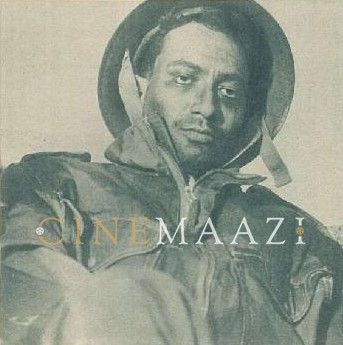
Subscribe to read full article
This section is for paid subscribers only. Our subscription is only $37/- for one full year.
You get unlimited access to all paid section and features on the website with this subscription.
Not ready for a full subscription?
You can access this article for $2 , and have it saved to your account for one year.
- Born: 22 January 1934 (Gurdaspur, Punjab, British India)
- Died: 23 February, 2004 (Bombay)
- Primary Cinema: Hindi
- Parents: Pishori Lal Anand
- Spouse: Sushma Kohli Anand
- Children: Vaibhav
Celebrated filmmaker, writer, editor and actor, Vijay Anand, also fondly called Goldie Anand, is best remembered for his stylish blockbusters such as Kala Bazar (1960), Tere Ghar Ke Saamne (1963), Teesri Manzil (1966), Jewel Thief (1967), Johny Mera Naam (1970) and most of all, for the iconic Guide (1965). The youngest of 9 siblings, including legendary director Chetan Anand and iconic actor-filmmaker Dev Anand, the brothers together built Navketan Films, which carved a reputation for contemporary story-telling and excellent music. Vijay directed most of his films for the family’s in-house banner.
Born on 22 January, 1934 in Gurdaspur to a successful and affluent advocate Pishori Lal Anand, Vijay followed in the steps of his brothers to Bombay, where he studied Arts. A student of English Literature at St. Xavier’s College, he had won accolades for his playwriting during his college days. Starting his career as a writer, he was inspired by the genre of film noir, to script Navketan’s Taxi Driver (1954). His made his directorial debut, Nau Do Gyarah (1957) at the age of 23, shooting it in 40 days with his brother Dev Anand and sister-in-law Kalpana Kartik. It had a plot similar to Hollywood hit It Happened One Night (1954) where a young girl runs away from an arranged marriage and meets the hero, falling in love with him after a series of adventures. Apparently, Vijay was doing his Master’s at the time and thought he would make the film and return to his studies – it wasn’t to be.
Vijay Anand went on to play a key role in shaping the career of his older brother Dev Anand, giving the latter some of the best roles of his career in Kala Bazaar, Tere Ghar Ke Samne, Jewel Thief, Johnny Mera Naam and Tere Mere Sapne (1971). His musical crime thriller Teesri Manzil with Shammi Kapoor also struck all the right chords. A hallmark of his films was the scintillating soundtracks often composed by S D Burman and later his son, R D Burman. Another key feature was the beautiful, innovative song picturisation, seen in numbers like O Haseena (Teesri Manzil), Kaaton se kheech ke yeh aanchal (Guide) and Honthon mein aisi baat (Jewel Thief). Anand famously shot Dil ka bhanwar kare pukar (Tere Ghar Ke Saamne) in a replica of Delhi’s Qutub Minar and filmed Guide’s Tere mere sapne in just four shots. He had developed a keen eye for dance owing to his spending his childhood with personalities such as Zohra Sehgal and Kameshwar Sehgal -who hailed from Uday Shankar’s dance academy - and Mohan Sehgal and Guru Dutt.
The period 1957-1970 was the acme of Vijay Anand's career. Pride of place is taken by his 1965 film Guide starring Dev Anand and Waheeda Rehman, which was a masterful adaptation of R.K. Narayan's novel about love, betrayal and redemption. One of the all-time greats of Hindi cinema, Guide wove in the finest elements of dance, drama, music and performance in a fantasy with a unique humanist ideology. Anand’s biggest hit, it was also his most critically acclaimed film and loved by the masses. His vision of depicting Rosie (Waheeda Rehman) as a strong and assertive woman who walks out of a bad marriage to live with her lover, but has him arrested when she finds out he cheated on her, is daring, distinctive and praise-worthy. Interestingly, Guide was originally supposed to be directed by Chetan Anand who had to leave to start his passion project Haqeeqat (1964). The responsibilty thus fell on Vijay Anand and the rest is history.
Vijay Anand’s directorial style combined visual sophistication with light- heartedness, and had no other parallel in Hindi film history. However, by the mid-1970s his career had hit a slump. A stint with Bhagwan Shree Rajneesh followed; he was said to be in the godman’s inner circle. He did return with multi-starrers like Ram Balram (1980) and Rajput (1982); however, his earlier flair was sorely missing. His personal favourite film though, was Tere Mere Sapne (1971), adapted from A J Cronin's The Citadel, as it drew from his own experiences.
He also faced the camera as an actor in films like brother Chetan Anand’s Haqeeqat (1964), Kora Kagaz (1974) in which he starred opposite Jaya Bachchan, Main Tulsi Tere Aangan Ki (1978), Chor Chor (1974) a songless thriller co-starring Leena Chandavarkar, Ghungroo Ki Aawaz (1981), Double Cross (1972) and Chhupa Rustam (1973). He also became known to the younger generation as detective Sam, in the television series Tehkikaat (1994).
Anand had also served as Chairman of the Central Board of Film Certification in 2002. However, he resigned within six months evidently due to ideological differences with the government over the screening of adult rated films. He was noted for his modern outlook while serving in this role, stemming from the many times his ow films ran into trouble with the Censors.
Recipient of the Filmfare Awards for Best Director and Best Dialogue for Guide (1965) and for Best Editing and Best Screenplay for Johnny Mera Naam (1970), Vijay Anand passed away in Mumbai of a heart attack on 23 February, 2004.
-
Filmography (12)
SortRole
-
Aavesam 1980
-
Bullet 1976
-
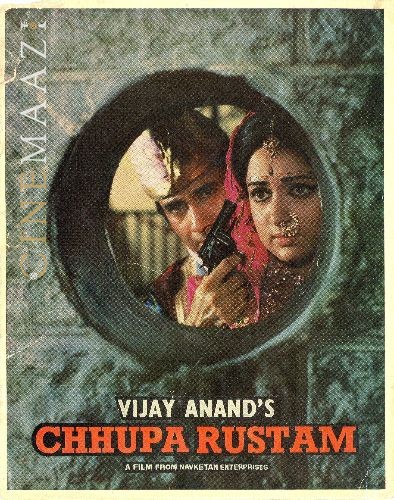
Chhupa Rustam 1973
-
Black Mail 1973
-
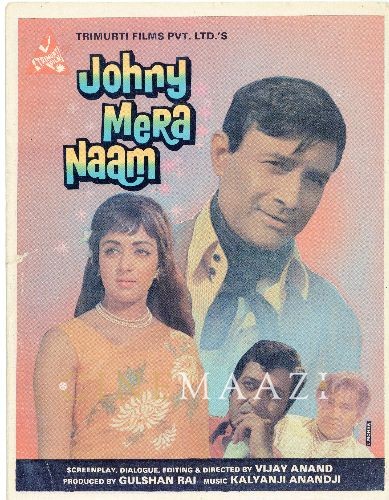
Johny Mera Naam 1970
-
Kahin Aur Chal 1968
-
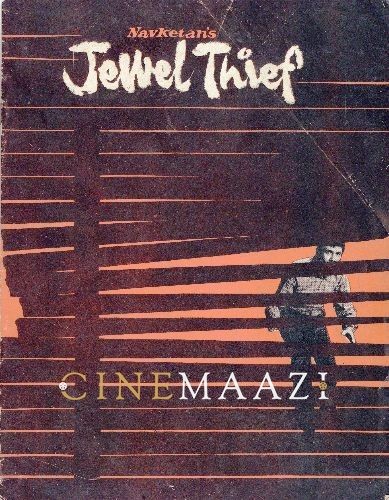
Jewel Thief 1967
-

Teesri Manzil 1966
-

Guide 1965
-
Tere Ghar Ke Samne 1963
-
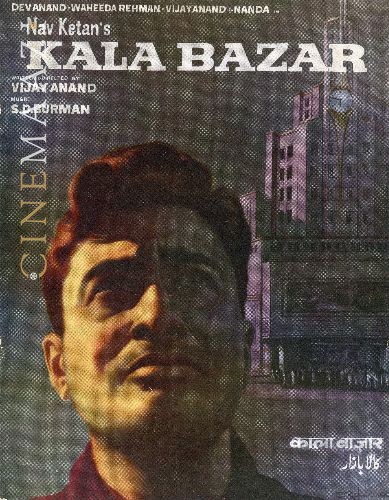
Kala Bazar 1960
-
Nau Do Gyarah 1957
-









.jpg)



